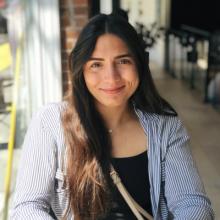Jen Baron
Why did you decide to pursue a graduate degree?
Through my undergraduate degree, I quickly became involved in research, from course projects to an honors thesis and several summers holding NSERC Undergraduate Student Research Awards. I enjoyed the lab and field work, but I particularly identified with the satisfaction of discovery: designing a project, answering a new question, and learning in the process. I felt certain that graduate school was the next step and was excited to propel my career forward and study a new phenomenon—wildfire.
Why did you decide to study at UBC?
I was attracted to the well-earned reputation and high standard of forestry research at UBC. I believed that, by learning from and collaborating with leaders in my field, my expertise and the quality and impact of my work would benefit greatly. Having connections (& friendships!) with students and faculty at the cutting edge of their discipline means we collectively advance our work in a dedicated and supportive environment.
What is it specifically, that your program offers, that attracted you?
For me, one of the best parts of being in a doctoral thesis is the autonomy and ownership I have over my own work. Through the PhD program, you become an expert in your domain of study, and "steer the ship" with guidance from your supervisory committee. The balance between their expertise and suggestions, and my vision for the project, has produced novel and exciting outcomes.
What was the best surprise about UBC or life in Vancouver?
Being surrounded by extremely accomplished and busy people, I was surprised to find an encouraging and supportive community at UBC Forestry. My colleagues are consistently uplifting their peers by sharing their expertise, collaborating on projects, submitting award nominations, and sharing in the successes and failures. This community was not something I expected from a large faculty but is now a core component of my graduate experience.
What aspect of your graduate program do you enjoy the most or are looking forward to with the greatest curiosity?
I really enjoy seeing how my work can address a need expressed by a community and be translated into action through management and policy. Although I love the process of research, hearing about its relevance and seeing it applied is really what makes it worthwhile, especially in the context of wildfire.
What aspects of your life or career before now have best prepared you for your UBC graduate program?
I was fortunate to have several research experiences as an undergraduate student which introduced me to the process of addressing scientific questions and inspired me to continue learning. In terms of specific skills, having a background in statistics and data science has been immensely valuable through my graduate work.
What do you like to do for fun or relaxation?
Like most people in forestry, I enjoy the outdoors! I especially love rock-climbing, skiing, paddle boarding, and gardening. I also became a real puzzle enthusiast through the pandemic, and always have one in-progress on my coffee table.
What advice do you have for new graduate students?
Graduate school can be overwhelming, and a major component of the experience is trying different approaches and learning from your mistakes. Building a strong community of peers, setting achievable and realistic goals, and structuring your research to reflect your interests were key factors that have helped me through my PhD.
